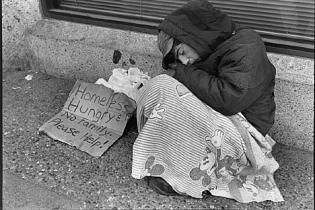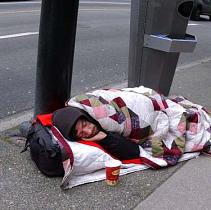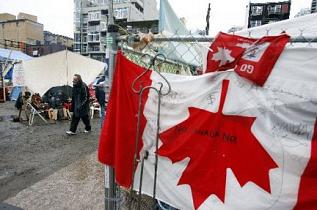Canada's mentailly ill left to rot on city streets
Here's the grim context. Today, it's widely acknowledged that the "deinstitutionalization" of psychiatric survivors has been a total failure and fraud; it was from the very start. Why? Because of government incompetence and negligence, poor urban planning, and public indifference to "discharged" psychiatric survivors and other poor, marginalized and stigmatized people in our communities.
Since the 1960s, more and more psycho-prisons have been shut down; yet there was, and still is, virtually no affordable and accessible housing built for the many thousands of people who have ended up on city streets as a result. As inner-city refugees, homeless psychiatric survivors, forcibly drugged, traumatized and discriminated against, frequently have no safe place to go. For all too many, the street, a shelter or an emergency ward are the only alternatives.
Over the past 40 years, this homelessness crisis has escalated in major cities across Canada and the United States. Tragically for the many thousands of vulnerable, alienated and traumatized people fraudulently labeled "mentally ill" in our allegedly caring and just society, high-rise condominiums for the rich have become the top priority for the corporate CEOs and real estate developers who control and manipulate the "housing market", instead of affordable and accessible housing. For these greedy capitalists, the bottom line is always profit, not people. Toronto today is so saturated with condos and other high-rise apartment buildings on virtually every city block that it should be called Condo City or New York North.
As you read this, thousands of homeless psychiatric survivors are struggling to survive on the street and in overcrowded and violence-ridden shelters where they are often exposed to tuberculosis, HIV/AIDS and other communicable diseases. According to the Toronto Disaster Relief Committee that tracks homeless deaths, approximately 500 homeless people have died since 2000. Faced with minimal community support and an almost complete lack of alternatives, many are forced back into psychiatric hospitals or wards, where they're drugged, degraded and traumatized all over again. On the street, these survivors are easy targets for the psychiatric police.
In Ontario, these agents of social control are called assertive community treatment teams (ACTTs) or Mobile Crisis Teams (each of the latter "teams" consist of a psychiatric nurse and an armed plainclothes police officer who ride around in unmarked police cars). Our government put these people in place to enforce draconian community treatment orders (CTOs), which authorize outpatient forced drugging and arrests of survivors refusing psychiatric "medication" or "voluntary" hospitalization.
Ten years ago, at a public meeting of the Toronto City Council's Neighbourhoods Committee, I tried to convince those in attendance that affordable and supportive housing for psychiatric survivors and other marginalized people was urgently needed. I pointed out that affordable housing should replace all psychiatric facilities, including the notorious Centre for Addiction and Mental Health (CAMH), and that government-funded housing initiatives could save not only the health and lives of thousands of survivors and others, but also millions of tax dollars every year. All that was needed was the political will; there is still no national affordable housing strategy in Canada.
My request was apparently too controversial or radical for this city committee to consider. The concerns voiced by several of us activists were greeted by committee chair Joe Pantalone and the other councilors with total silence. Not one asked us any questions; not one made a comment. These politicians simply refused to listen; they tuned us out. Perhaps we were too idealistic. But at least we were serious, clearly articulating our issues and concerns based on our close and continuing contact with hundreds of homeless and under-housed psychiatric survivors and other homeless brothers and sisters on the street. Frequently participating with homeless people in the occupation of vacant buildings and other direct actions to dramatize Toronto's escalating homelessness/housing crisis, we demanded, and still demand, political action.
internet site reference: LINK
Comments
There are 0 comments on this post



















